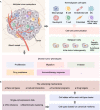Cancer biology deciphered by single-cell transcriptomic sequencing
- PMID: 34405376
- PMCID: PMC8901819
- DOI: 10.1007/s13238-021-00868-1
Cancer biology deciphered by single-cell transcriptomic sequencing
Abstract
Tumors are complex ecosystems in which heterogeneous cancer cells interact with their microenvironment composed of diverse immune, endothelial, and stromal cells. Cancer biology had been studied using bulk genomic and gene expression profiling, which however mask the cellular diversity and average the variability among individual molecular programs. Recent advances in single-cell transcriptomic sequencing have enabled a detailed dissection of tumor ecosystems and promoted our understanding of tumorigenesis at single-cell resolution. In the present review, we discuss the main topics of recent cancer studies that have implemented single-cell RNA sequencing (scRNA-seq). To study cancer cells, scRNA-seq has provided novel insights into the cancer stem-cell model, treatment resistance, and cancer metastasis. To study the tumor microenvironment, scRNA-seq has portrayed the diverse cell types and complex cellular states of both immune and non-immune cells interacting with cancer cells, with the promise to discover novel targets for future immunotherapy.
Keywords: cancer; single-cell transcriptomic sequencing; tumor microenvironment.
© 2021. The Author(s).
Figures


References
Publication types
MeSH terms
LinkOut - more resources
Full Text Sources
Medical

